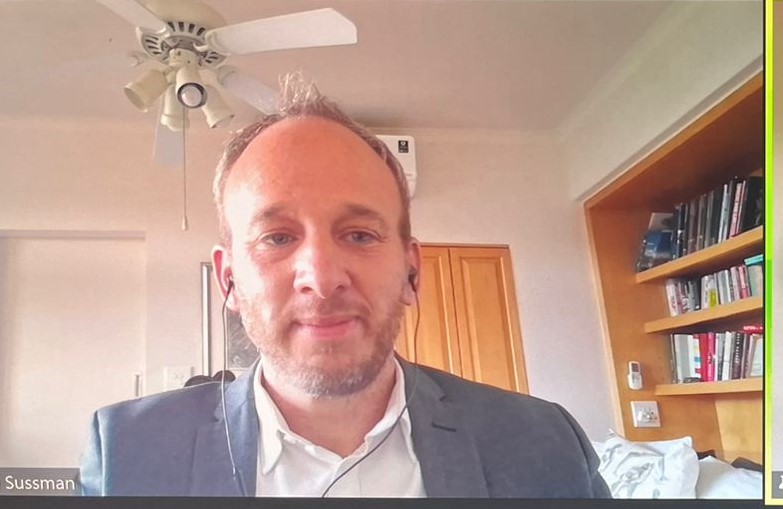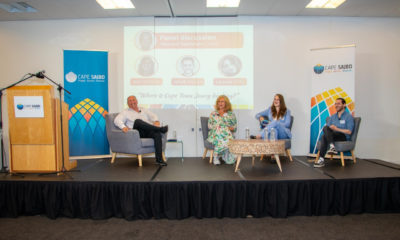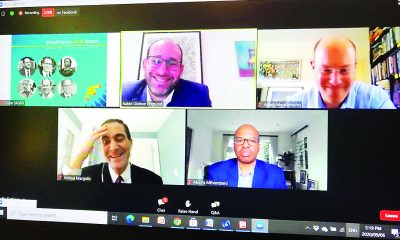
Community

ANC’s anti-Israel stance ‘a tactic to lure voters’
The African National Congress (ANC) is unlikely to form a coalition government with the Economic Freedom Fighters (EFF) after the 2024 national elections, but is likely to form a coalition with smaller parties including Al Jamah-ah and the National Freedom Party, both of which have made vehemently anti-Israel statements in the past.
Furthermore, the ANC may double down on its current anti-Israel stance ahead of the elections to pull Muslim voters away from the Democratic Alliance (DA).
These were some of the points made by local political analyst Wayne Sussman in his keynote address to the Cape South African Jewish Board of Deputies (Cape Board) annual conference, held as a webinar on 28 November. “The Israel-Hamas war could become a central issue of the ANC’s campaign” said Sussman.
“There are, of course, Muslim voters, like Jewish voters, who care deeply about the war between Israel and Hamas,” he told the SA Jewish Report after the event. “But like Jewish voters, Muslim voters care about a range of issues. They care about the economy, crime, job opportunities for their kids, the cost of living, et cetera. So Muslim voters, like Jewish voters, will weigh this up with parties’ foreign policy positions when making choices about who to vote for. Having said that, the ANC will want to use its firm position on Israel and its solidarity with the Palestinians to its benefit in that regard.”
A new trend, he said, is for voters to back parties that represent their unique communities, rather than the bigger parties. “They want parties in power that unapologetically represent their interests.” This will lead to further fragmentation of the vote and even more coalition politics ahead. Parties like the Inkatha Freedom Party (IFP); the Patriotic Alliance (PA); and the Freedom Front Plus will benefit from this.
What the ANC has on its side in voters’ eyes is that there’s no other party that the people trust more with the dispensing of social grants, Sussman said. There’s also a level of faith that the ANC will still resolve loadshedding, especially if the power crisis improves over the festive season. And finally, the ANC’s foreign policy may draw voters.
However, Sussman notes that the ANC is losing popularity in the most populous areas of Gauteng. “If the ANC cannot recover among black voters in Gauteng, it’s in big trouble,” he said. Similarly, the IFP is “eating the EFF for breakfast” in KwaZulu-Natal, and the EFF is experiencing growth only in smaller rural towns as opposed to bigger towns and metros.
“In 2021, there was a lot of fragmentation in our politics,” said Sussman. “It’s likely, with many new entrants into the 2024 elections, that that fragmentation will continue and bigger parties will continue to find it challenging.”
As for the DA, Sussman believes at this stage, it can maintain power in the Western Cape. “Its vulnerabilities are PA growth and its hold on Muslim voters who supported the DA in the past few elections.”
He said that if the EFF or the DA formed coalitions with the ANC, it would hurt all parties involved. “The Moonshot Pact may excite voters, but it won’t form our next government. It’s likely to be the ANC with smaller parties.”
Meanwhile, the head of the Cape Board’s antisemitism and legal subcommittee, Simone Sulcas, said, “As expected, the current war in Gaza has manifested in a sharp rise in antisemitism in South Africa. We have recorded more antisemitic incidents in the past seven weeks than in the entire preceding year. In October and November, there were 110 incidents reported countrywide as opposed to 73 in total last year. The Western Cape accounts for 35 of those 110 incidents.”
However, she noted that “in spite of this sharp incline, our numbers are low when compared with Jewish communities abroad”.
“Antisemitism can be direct, for example the display of a Nazi symbol, or indirect, where criticism of Israel is used as a front to perpetuate antisemitic tropes against Jews and Jewish institutions,” Sulcas said. “We’re experiencing both at present. Our core mandate as the Cape Board is to combat antisemitism through a variety of methods.”
These include legal action, education, political lobbying, and media activism. “We fulfil this mandate via our antisemitism and legal subcommittee made up of our executive, a research journalist, six lawyers, and our professional team,” said Sulcas.
Regarding legal action, the Board had various options available, she said. “Criminal charges can be laid where the antisemitism manifests in an assault or vandalism of property or where there’s an intentional and serious violation of a person’s dignity and privacy. In terms of civil redress, we can lay a complaint with the South African Human Rights Commission or institute action via the Equality Court.
“We have been consulting locally and abroad as well as with key stakeholders in the Cape. We have sought the opinion of senior advocates and experts in criminal law to assist us on matters pertaining to online, physical, or verbal antisemitism and incitement. We have investigated protest action outside the [Cape Town Jewish community campus] Samson Centre, Parliament, Herzlia, Jewish businesses, and individuals who have been harassed.”
Two cases of vandalism at the Samson Centre have been opened; charges of assault have been laid regarding the pro-Israel protester attacked outside Parliament; Christian Friends of Israel has opened a few cases of assault following the Christian protest that was disrupted; and there have been five cases of assault in Johannesburg, of which two criminal charges have been laid.
“We have to assess each case within the framework of our Constitution and the legislation,” said Sulcas about legal action regarding hate speech. “While the Constitution protects freedom of expression, this freedom doesn’t extend to hate speech. The leading ‘hate speech’ case on antisemitism is the Masuku case. This case sets up a clear parameter to the effect that ‘anti-Zionist’ rhetoric is not per se considered hate speech [in South Africa]. What’s needed is a case that successfully shows that in certain instances, anti-Zionism is in fact a front for antisemitism and is indeed hate speech.
“It’s through this lens that we have to assess whether legal action in the Equality Court will be successful,” said Sulcas. “Even in a case where there are good prospects of success, we always need to apply a holistic assessment.”
Regarding protests, “It’s important to appreciate that in terms of our Constitution, the right to protest peacefully is guaranteed under Section 17. An urgent interdict to curtail a protest can be sought only where the protest is unlawful, with the threat of violence or damage to property. The local authorities can also set conditions regarding the protest. In so far as the flying of flags at these protests, Hamas, Palestinian Islamic Jihad, and Hezbollah are not seen as terrorist organisations in South Africa, hence the flags aren’t illegal. We are, however, investigating the flying of ISIS [Islamic State] flags.”
Regarding boycotts targeting Jewish-owned businesses or businesses selling Israeli products, the Cape Board and the national South African Jewish Board of Deputies work together is assisting boycotted business by issuing press statements, contacting stakeholders, and providing overall support.
Antisemitism often manifests in the form of graffiti. “We report this immediately to the City of Cape Town, which has been diligent in removing it,” Sulcas said.
“To conclude, our antisemitism and legal subcommittee is doing everything possible to ensure that it fulfils its mandate and combats antisemitism using every available resource.”











Chrissie
December 2, 2023 at 3:32 pm
Fully agree anc is scared now they lure voters with this horrific stunt